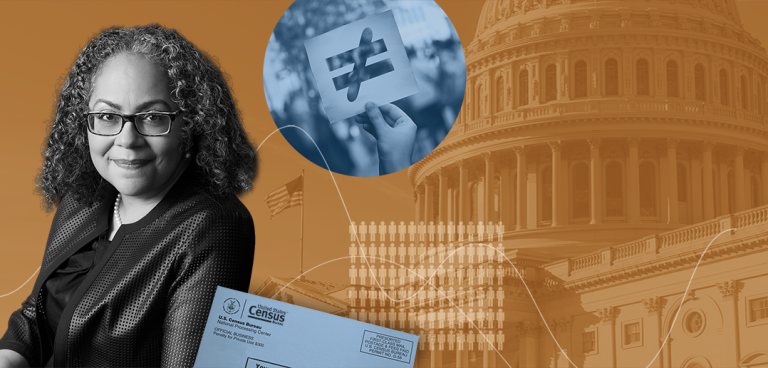Tanya Hernández is the Archibald R. Murray Professor of Law at Fordham Law and an internationally recognized expert on anti-discrimination and comparative race law.
Hernández is a leading voice on issues of race and the law, with extensive scholarship on critical race theory, implicit bias, and racial equity in the legal system. She teaches classes on comparative employment discrimination, critical race theory, and other topics at Fordham Law. She is also the author of four books, including Racial Subordination in Latin America: The Role of the State, Customary Law and the New Civil Rights Response and Racial Innocence: Unmasking Latino Anti-Black Bias and The Struggle for Equality.
In the Q&A below, Hernández discusses her forthcoming book, due out in 2026, which explores the ways the U.S. Census tends to undercount the number of Black people in the U.S., leading to a loss of adequate funding and a gap in political representation. She described the book as the first of its kind to “assess the Black differential undercount as a global phenomenon,” offering novel solutions grounded in international human rights frameworks.
What legal subject are you currently working on?
I am currently writing a book entitled (Under)Counting Blackness Across the Globe: The Civil Rights Crisis of Census Racial Erasure. I am fortunate to already have a book contract for publication of my research with Beacon Press. As an independent non-profit publisher specializing in trade and scholarly nonfiction, publishing with Beacon will enable me to reach a much broader audience beyond the law journal reading public.
How does the subject matter you are working on impact people?
Census-taking is critical to power sharing in the pursuit of an effective multiracial democracy and the fair allocation of resources. The U.S. Constitution mandates that census data be used for the apportionment of congressional seats so that states can have an adequate number of legislative representatives account for their needs in law making. Nevertheless, Black people have been consistently undercounted. When Black residents are not fully counted, fewer congressional seats are allocated to the states in which they live. In effect, the Black undercount deprives an entire state of adequate representation.
The political representation harms of the Black undercount are further magnified by the significant injury they impose upon the enforcement of the Voting Rights Act. Black census undercounting demolishes any possibility of a true multiracial democracy. Moreover, census data are vital to human flourishing. In the United States, substantial sums numbering in the billions are disbursed based on census data. The allocations include funding for Medicaid federal health insurance, Federal Emergency Management Agency relief, public health preparedness, the Children’s Health Insurance Program, the Child Care and Development Fund, foster care programs, adoption assistance programs, educational programs, workforce training programs, and Community Block Development Grants, among many other programs.
Indeed, census-driven funding makes a substantial contribution to the U.S. economy. Each person missed in a census substantially reduces the fair share of federal funding to a locality and its ability to serve the needs of their populace. A locality’s forfeit of federal funding harms those who are most in need. In 2020 alone, the Black undercount was estimated to incur a loss of $8 billion in funding to Black communities. The differential undercount of Black people ensures that the inequitable distribution of federal funding has a color besides green.
Why is this scholarship important?
At its most fundamental level, the census count of residents by race makes clear that racially marginalized communities exist. Being counted on a census form is the first step towards making social justice demands that government entities incorporate formerly excluded racial groups into social policies. (Under) Counting Blackness Across the Globe will be the first book to assess the Black differential undercount as a global phenomenon, and to recommend that the best response to the problem is an international human rights approach that unites Black people across the African Diaspora in their common struggle to be counted. In addition to social justice activists and civil rights leaders, all those who are interested in learning more about how to be a truly inclusive society will find useful insights.
What have you learned about this topic or issue that people may not realize?
The consideration of U.S. census data in a vacuum obscures the significance of its racial impacts. In fact, the failure to fully count Blackness extends beyond U.S. boundaries and the specificity of its racial history. Examining the problem of the Black census undercount from a transnational comparative perspective reveals what is rarely named in the analysis of census taking–- governmental anti-Blackness. The transnational importance of Black census undercounting became especially clear to me when I was invited to a 2024 international research consultation on the creation of a United Nations Declaration on the Promotion, Protection and Full Respect of the Human Rights of People of African Descent. At the gathering, racial justice scholars and activists from across the world emphatically underscored how crucial census data is to Black equality pursuits internationally.
How does your scholarship in this area relate to your teaching?
This book project directly relates to my teaching of anti-discrimination law. Census racial data can make visible any racial disparities that exist in access to important public goods such as access to education, employment, housing, medical services, etc. and its data is crucial to proving many discrimination claims. In short, a census count of its population by race provides concrete data about racial hierarchies and exclusion. Without it, systemic racism is rendered invisible. As I often tell my students—the devil is in the details.

